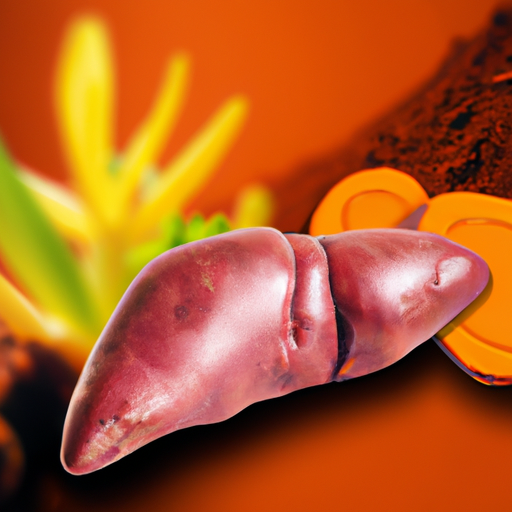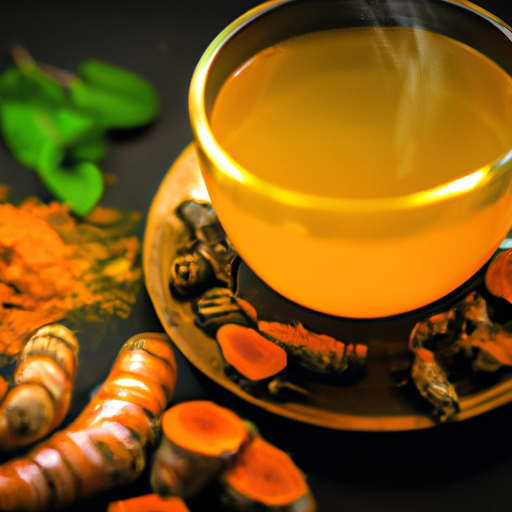Being a healthcare professional, I frequently get inquiries about the health advantages of different supplements and natural remedies. Turmeric is among the remedies that have become increasingly popular lately. Curcumin, its active component, is praised for its anti-inflammatory properties and possible health benefits like enhancing brain function and lowering the chances of heart disease and cancer.
However, there have been claims that turmeric may also raise liver enzymes, leading to concerns about its safety. Liver enzymes are important indicators of liver function and can be measured through a blood test. Elevated levels of liver enzymes may indicate liver damage or disease.
With the increasing use of turmeric as a natural remedy, there have been questions about its effects on liver enzymes. In this article, we will explore the claims surrounding turmeric and liver enzymes, as well as its potential health benefits, the role of the liver in the body, and other factors that may affect liver enzyme levels.
We will also discuss the dosage and administration of turmeric, potential risks and side effects, and provide final thoughts and recommendations based on the available evidence.
Key Takeaways
- Turmeric may raise liver enzymes, but more research is needed to understand the relationship between turmeric and liver health.
- Elevated levels of liver enzymes can indicate liver damage or disease, so it’s important to discuss any concerns about liver enzyme levels with a doctor and disclose all supplements and medications being taken.
- High doses of turmeric may cause liver damage, especially in those with pre-existing liver disease or taking medications affecting liver function.
- Alternative liver health supplements may be worth considering, such as milk thistle, and maintaining a healthy diet and lifestyle can also promote liver health.
What are liver enzymes and why are they important?
You need to understand what liver enzymes are and why they’re so crucial to your body’s overall health.
Liver enzymes are proteins produced by the liver that help regulate chemical reactions in the body. They play a vital role in the digestion, metabolism, and elimination of toxins from the body. Some of the key liver enzyme functions include breaking down carbohydrates, fats, and proteins, producing bile, and filtering harmful substances from the blood.
Liver enzyme tests are used to measure the levels of specific enzymes in the blood. These tests are often performed as part of routine blood work or to monitor liver function in people with liver disease or those taking medications that can affect the liver.
Elevated levels of liver enzymes can indicate liver damage or disease, but it’s important to note that not all liver enzyme abnormalities are a cause for concern. With this in mind, let’s explore the claims surrounding turmeric and liver enzymes.
The Claims Surrounding Turmeric and Liver Enzymes
Feeling concerned about the health of your liver? Well, it’s important to be aware of the various claims surrounding a certain spice and its potential impact on liver enzymes.
Turmeric, a spice commonly used in Indian and Middle Eastern cuisine, has been the subject of much research in recent years. Some studies suggest that turmeric supplements can increase the levels of liver enzymes, which has led to concerns about its potential impact on liver function.
However, it’s important to note that the evidence on this topic is mixed. While some clinical trials have shown that turmeric can indeed increase liver enzymes, others have found no significant impact. Additionally, some studies have even suggested that turmeric may have a protective effect on liver function.
Ultimately, more research is needed to fully understand the relationship between turmeric and liver health.
Turmeric’s Potential Health Benefits
If you’re looking for a natural way to potentially improve your overall health, incorporating turmeric into your diet may be worth considering. This spice, commonly used in Indian and Middle Eastern cuisine, has been used for centuries for its potential health benefits.
Turmeric’s culinary uses are vast and varied, making it easy to incorporate into your diet. It can be used as a spice in dishes like curries, soups, and stews, or it can be steeped in hot water to make a tea. Not only is turmeric delicious, but it may also have potential health benefits. Studies have shown that turmeric may help improve cognitive function, making it a valuable addition to your daily routine.
| Health Benefit | Evidence | |
|---|---|---|
| 1 | Anti-inflammatory properties | Studies have shown that turmeric can reduce inflammation and may be helpful in treating conditions like arthritis and IBS. |
| 2 | Anti-cancer properties | Some studies have found that turmeric may have anti-cancer properties. |
| 3 | Improved brain function | Turmeric has been shown to improve cognitive function and may be helpful in treating conditions like Alzheimer’s. |
| 4 | Improved heart health | Studies have found that turmeric may help improve heart health by reducing inflammation and improving cholesterol levels. |
| 5 | Anti-depressant properties | Some studies suggest that turmeric may have anti-depressant properties. |
Incorporating turmeric into your diet may have potential health benefits, including improved cognitive function. In the next section, we will explore turmeric’s anti-inflammatory properties in more detail.
Turmeric’s Anti-Inflammatory Properties
Turmeric is like a superhero for your body, fighting against inflammation and potentially reducing the risk of chronic diseases. Its anti-inflammatory properties stem from its active ingredient, curcumin, which has been shown to inhibit inflammatory pathways in the body.
Here are some ways that turmeric can reduce inflammation:
- Turmeric can decrease the production of inflammatory molecules, such as cytokines, in the body.
- Turmeric can increase the activity of anti-inflammatory enzymes, such as heme oxygenase-1 (HO-1), which helps to protect against oxidative stress.
- Turmeric can improve gut health by promoting the growth of beneficial gut bacteria, which in turn can reduce inflammation in the body.
Given the role of inflammation in the development of chronic diseases, such as heart disease, cancer, and Alzheimer’s disease, turmeric’s anti-inflammatory properties are particularly promising. In fact, some studies have suggested that regular consumption of turmeric may help to reduce the risk of these diseases.
As we explore the role of the liver in the body, it’s important to keep in mind how turmeric can support overall health and wellness.
The Role of the Liver in the Body
The liver, a vital organ in the body, plays a crucial role in maintaining overall health and wellness. One of its primary functions is detoxification, where it filters out harmful toxins from the blood.
The liver also produces bile, which aids in digestion, and stores important nutrients such as iron and vitamins. However, liver disease can occur when the liver becomes damaged or inflamed. This can happen due to a variety of reasons, including alcohol consumption, viral infections, and certain medications.
When the liver is damaged, it may not be able to function properly, resulting in elevated liver enzyme levels. These enzymes can be measured through blood tests and can indicate liver damage or disease. Other factors that may affect liver enzyme levels will be discussed in the subsequent section.
Other Factors that May Affect Liver Enzyme Levels
You probably don’t want to hear this, but something as innocent as taking a daily multivitamin or herbal supplement could be contributing to your elevated liver enzyme levels. Genetic predisposition, alcohol consumption, and medication interactions can also play a role.
While some people may have a genetic predisposition to higher liver enzyme levels, alcohol consumption can also be a significant factor. Even moderate alcohol consumption can increase liver enzyme levels, especially if the liver is already compromised. Additionally, certain medications can cause liver enzyme levels to rise.
Therefore, it’s crucial to inform your doctor about any supplements or medications you’re taking, including herbal remedies like turmeric.
Many factors can contribute to elevated liver enzyme levels, including genetic predisposition, alcohol consumption, and medication interactions. It’s essential to discuss any concerns with your doctor and disclose all supplements and medications you’re taking. This will help your doctor determine the underlying cause of elevated liver enzyme levels and develop a treatment plan if necessary.
In the next section, we’ll discuss the dosage and administration of turmeric, a supplement that’s been linked to liver enzyme elevation.
Dosage and Administration of Turmeric
When it comes to taking turmeric, it’s important to understand the recommended dosage and different forms available. As an AI language model, I can’t provide medical advice. However, according to research, the optimal dosage of turmeric varies depending on the intended use and the individual’s health condition.
Additionally, turmeric is available in various forms, including powdered spice, capsules, and extracts. Each form has varying levels of active ingredients and bioavailability.
Recommended Dosage
To avoid potential liver damage, it’s important to stick to the recommended dosage of turmeric supplements. The appropriate dose of turmeric varies depending on the form of the supplement, as well as the reason for taking it.
For instance, the recommended dose for turmeric powder is 400-600mg three times a day, while the recommended dose for standardized curcumin extract is 400-600mg two to three times a day. It’s worth noting that exceeding the recommended dosage of turmeric may lead to possible side effects, including upset stomach, dizziness, and diarrhea.
Additionally, high doses of turmeric may cause liver damage, especially in people with pre-existing liver disease or those taking medications that affect liver function. Therefore, it’s crucial to consult with a healthcare professional before taking turmeric supplements, especially if you have a medical condition or take prescription medications.
When it comes to different forms of turmeric, there are various options available, including powders, capsules, and extracts. Each form has its own set of advantages and disadvantages, and choosing the right one depends on individual preferences and needs.
Different Forms of Turmeric
It’s important to consider the various forms of turmeric available, such as powders, capsules, and extracts, in order to choose the best option for your individual needs and preferences.
Turmeric supplements are a popular option for those looking to boost their intake of curcumin, the active ingredient in turmeric. These supplements come in various forms, including capsules, tablets, and liquid extracts. When choosing a supplement, it’s important to read the label and choose a product that contains a standardized amount of curcumin.
Turmeric is also a commonly used spice in cooking and can be found in many forms, including fresh, dried, and ground. Fresh turmeric root can be grated or chopped and added to dishes, while dried turmeric powder is a popular ingredient in curries and other Indian dishes. When using turmeric in cooking, it’s important to note that it may not provide the same health benefits as a supplement, as the amount of curcumin present can vary depending on the preparation method.
It’s important to be aware of the potential risks and side effects of turmeric, especially if taking supplements.
Potential Risks and Side Effects
As a healthcare provider, I always ensure that my patients are aware of the potential risks and side effects associated with any medication or supplement they take.
When it comes to turmeric, three key points to consider are allergic reactions, interactions with medications, and unknown risks. Allergic reactions to turmeric are rare but can still occur, especially in those with a history of allergies to plants in the ginger family.
Additionally, turmeric may interact with certain medications, such as blood thinners, and cause adverse effects.
Finally, the long-term effects of turmeric use remain largely unknown, making it important to approach its use with caution.
Allergic Reactions
Allergies can cause your body to react negatively to turmeric, which may result in symptoms like hives, itching, and difficulty breathing. In some cases, allergic reactions can be severe and require immediate medical attention. If you experience any of these symptoms after consuming turmeric, it’s important to seek medical help right away.
Here are some potential treatment options for allergic reactions to turmeric:
- Antihistamines can help alleviate symptoms like hives and itching by blocking the effects of histamine, a chemical that’s released during an allergic reaction.
- Corticosteroids can reduce inflammation and swelling caused by an allergic reaction.
- In severe cases, a shot of epinephrine may be necessary to alleviate symptoms like difficulty breathing and swelling of the face, tongue, or throat.
- If you have a known allergy to turmeric, the best way to prevent an allergic reaction is to avoid consuming it altogether.
Moving on to the next section about interactions with medications, it’s important to note that turmeric may interact with certain medications in unexpected ways.
Interactions with Medications
Be cautious when taking turmeric with certain medications, as it can interact with them in unexpected ways. Turmeric may interact with medications that affect blood clotting, such as aspirin, warfarin, and clopidogrel. If taken together, these medications and turmeric may increase the risk of bleeding.
Additionally, turmeric may interact with medications that are metabolized by the liver, such as statins, anti-inflammatory drugs, and some antidepressants. Turmeric may increase the activity of liver enzymes, which can affect the way these medications are metabolized and may lead to adverse effects.
It’s important to discuss with a healthcare provider when considering taking turmeric with any medication. The dosage recommendation for turmeric varies depending on the condition being treated and the individual’s health status. It’s also important to be aware of any potential side effects or interactions with other medications.
Taking turmeric with caution and under the guidance of a healthcare provider can help reduce the risk of negative interactions. Moving forward, it’s important to consider unknown risks associated with turmeric and its effects on liver enzymes.
Unknown Risks
It’s crucial to understand the potential risks associated with consuming turmeric, particularly in relation to its impact on the liver. While turmeric has been used for centuries in traditional medicine, research is still ongoing to determine its safety and efficacy as a dietary supplement. One concern is the risks of turmeric supplements, which have been linked to liver damage and elevated liver enzymes in some studies.
To illustrate the potential risks of turmeric consumption, consider the following table:
| Study | Findings |
|---|---|
| A 2017 study in the Journal of Clinical and Experimental Hepatology | Found that a patient developed acute liver injury after taking a turmeric supplement for 2 weeks |
| A 2016 study in Hepatology | Reported that a patient developed autoimmune hepatitis after taking turmeric supplements for several months |
| A 2018 study in the Journal of Dietary Supplements | Observed that turmeric supplements caused a significant increase in liver enzymes in healthy volunteers |
These findings raise safety concerns with regular turmeric consumption, particularly in those with pre-existing liver conditions or who take medications that affect liver function. As with any supplement or medication, it’s important to consult with a healthcare provider before adding turmeric to your diet.
It’s important to consider the potential risks associated with turmeric consumption, particularly in regards to liver damage and elevated liver enzymes. While turmeric has been used in traditional medicine for centuries, more research is needed to determine its safety and efficacy as a supplement. It’s recommended to consult with a healthcare provider before adding turmeric to your diet, especially if you have pre-existing liver conditions or take medications that affect liver function.
Final Thoughts and Recommendations
Overall, it’s important to prioritize liver health and consult with a healthcare professional before regularly consuming turmeric supplements or incorporating it into your diet. While there is some evidence that turmeric may have liver-protective effects, it’s important to consider the potential risks, especially if you have a history of liver disease or are taking medications that affect liver function.
If you do decide to take turmeric supplements, it’s recommended to monitor your liver function tests regularly to ensure that they’re not being negatively affected.
There are also alternative liver health supplements that may be worth considering, such as milk thistle, which has been shown to have liver-protective effects in some studies.
Additionally, maintaining a healthy diet and lifestyle can also promote liver health. This includes avoiding excessive alcohol consumption, maintaining a healthy weight, and avoiding exposure to toxins and pollutants.
Ultimately, the best way to support liver health is through a comprehensive approach that includes a healthy diet, regular exercise, and consulting with a healthcare professional to determine the best course of action for your individual needs.
Frequently Asked Questions
Can turmeric completely reverse liver damage caused by alcohol or drugs?
While turmeric has liver healing properties, it cannot completely reverse liver damage caused by alcohol or drugs. However, incorporating turmeric into a healthy diet may provide some benefits for liver health.
How long does it take for turmeric to show an effect on liver enzyme levels?
Turmeric supplementation benefits liver health by reducing inflammation and oxidative stress. It may take several weeks to months to see an effect on liver enzyme levels. A recommended daily dosage for liver health is 500-2000mg of curcumin.
Can taking turmeric in high doses lead to elevated liver enzymes?
Understanding the connection between turmeric dosage and liver enzyme levels is important. Potential risks include elevated liver enzyme levels. Evidence suggests caution when taking high doses of turmeric, especially if you have liver disease.
Are there any other natural remedies to lower liver enzyme levels besides turmeric?
Looking beyond turmeric, there are various natural remedies to lower liver enzyme levels. Detox diets and herbal supplements can be effective, while acupuncture and yoga may also help improve liver function.
Is it safe to take turmeric supplements with prescription medications that affect liver function?
It is important to consult with a healthcare provider before taking turmeric supplements with prescription medications that affect liver function due to potential interactions with other supplements. Correct dosage and administration should also be discussed.
Conclusion
In conclusion, the claims surrounding turmeric and its effects on liver enzymes remain inconclusive. While some studies suggest that turmeric may increase liver enzyme levels, others assert that it has no significant impact.
However, there is no denying that turmeric has potential health benefits, including its anti-inflammatory properties. It’s important to note that liver enzyme levels can also be affected by other factors, such as medication and alcohol consumption.
Therefore, it’s crucial to consult with a healthcare professional before taking turmeric supplements, especially if you have a pre-existing liver condition. As with any supplement, it’s also essential to adhere to the recommended dosage and administration guidelines.
Overall, while turmeric may offer potential health benefits, it’s crucial to exercise caution and prioritize your liver health.










